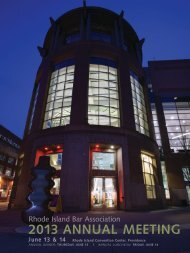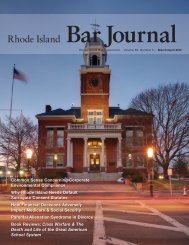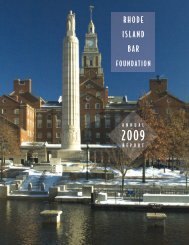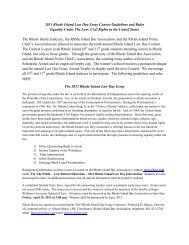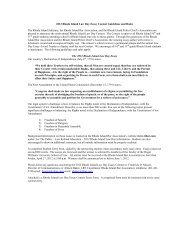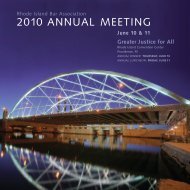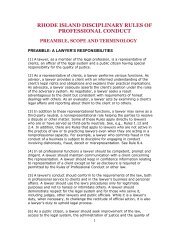Are We Taking The Sex Offender Label Too Far? - Rhode Island Bar ...
Are We Taking The Sex Offender Label Too Far? - Rhode Island Bar ...
Are We Taking The Sex Offender Label Too Far? - Rhode Island Bar ...
You also want an ePaper? Increase the reach of your titles
YUMPU automatically turns print PDFs into web optimized ePapers that Google loves.
tutional concerns because “the threat of<br />
enforcement of an overbroad law may<br />
deter or ‘chill’ constitutionally protected<br />
speech—especially when the overbroad<br />
statute imposes criminal sanctions.” 14<br />
“[E]ven minor punishments can chill<br />
protected speech.” 15<br />
For a concrete illustration of how this<br />
would work, consider the well-known<br />
First Amendment case of Hustler<br />
Magazine v. Falwell, 485 U.S. 46 (1988).<br />
<strong>The</strong> Hustler parody, consisting of a crude<br />
fake interview with Pastor Jerry Falwell,<br />
clearly stated false information portraying<br />
Falwell and his mother as drunk and<br />
immoral, even though it was clear to<br />
most readers that the interview was fake.<br />
<strong>The</strong> Court held that Hustler’s fake interview<br />
was protected speech under the<br />
First Amendment, and Hustler was not<br />
liable for any harm it may have caused.<br />
Now, take the exact same facts in<br />
Hustler, but instead of printing the parody<br />
interview in a magazine, Hustler uploads<br />
the interview to their website from a<br />
computer in <strong>Rhode</strong> <strong>Island</strong>. Because the<br />
fake interview contains false data –<br />
namely that Jerry Falwell drinks alcohol<br />
to excess and had an incestuous relationship<br />
with his mother – the transmission<br />
of the interview onto the Hustler website<br />
would violate section 11-52-7(b). However,<br />
the United States Supreme Court has<br />
already held that the Hustler interview is<br />
constitutionally protected from regulation.<br />
<strong>The</strong>refore, the fact that Hustler’s protected<br />
speech would be illegal under section<br />
11-52-7(b) proves the statute is overly<br />
broad and inhibits protected speech.<br />
Placing criminal penalties on that conduct,<br />
including up to one year in prison or a<br />
$500 fine, could substantially chill the<br />
free expression of constitutionally protected<br />
speech over the Internet.<br />
As overbroad as section 11-52-7(b)(1)<br />
is, section 11-52-7(b)(2) is far worse.<br />
Section 11-52-7(b)(2) imposes criminal<br />
liability when one “knowingly… makes,<br />
presents or uses or causes to be made,<br />
presented or used any data for any other<br />
purpose with knowledge of its falsity.” 16<br />
Thus, in its broadest form, section 11-52-<br />
7(b)(2) proscribes conduct where false<br />
data is merely made on a computer for<br />
any purpose (even private use only),<br />
without that data ever being transmitted<br />
to anyone else.<br />
<strong>The</strong> statutory definition for “data” is<br />
exceptionally broad in its own right and,<br />
thus, contributes substantially to the<br />
overbreadth of section 11-52-7(b)(2). In<br />
its broadest sense, the following would<br />
qualify as data: “any representation of…<br />
knowledge, facts [or] concepts… which<br />
are being prepared… and are intended to<br />
be entered… or stored in a computer.” 17<br />
Inserting that definition of “data” into<br />
section 11-52-7(b)(2) (in place of the word<br />
itself) demonstrates just how disturbingly<br />
overbroad it truly is. Essentially, when<br />
one knowingly prepares inaccurate facts<br />
and intends to enter them into their own<br />
personal computer, a crime has been<br />
committed, even before the facts are<br />
actually entered or stored. <strong>The</strong>refore,<br />
while section 11-52-7(b)(1) criminalizes<br />
“the sky is purple” once it is transmitted<br />
over a network, section 11-52-7(b)(2)<br />
criminalizes the inaccurate fact the<br />
moment the first letter is typed on the<br />
computer screen, or sooner, with no<br />
intent on ever sharing the message with<br />
others. This raises not only First<br />
Amendment concerns with the statute,<br />
but also concerns with the constitutional<br />
right to privacy.<br />
Although it does not explain all of<br />
the statutory defects, the history of this<br />
statute may bring some understanding as<br />
to why the General Assembly drafted it<br />
<strong>Rhode</strong> <strong>Island</strong> <strong>Bar</strong> Journal November/December 2011 7




